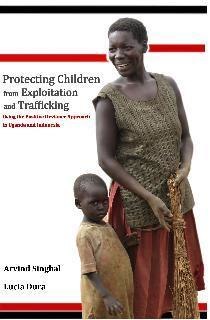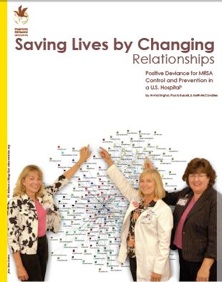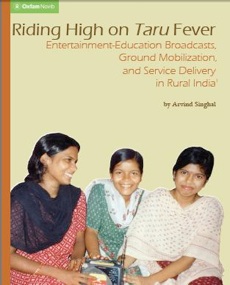

Arvind Singhal, Prucia Buscell, and Curt Lindberg (2010). Inviting Everyone: Healing Healthcare through Positive Deviance. Bordentown, NJ: PlexusPress.
Positive Deviance (PD) is an approach to social change that enables communities and organizations to discover the wisdom they already have, and then to act on it. The premise of PD is that in every community there are certain individuals or groups whose uncommon practices or strategies enable them to find better solutions to problems than neighbors and peers who have access to the same resources. PD is led by people in the community who help identify and spread the successful practices. Ideas for change are more likely to be accepted and adopted when they are based on existing local wisdom than they are when outside exports try to impose them. This book tells the remarkable story of how a people-centered approach to organizational and social change, accompanied by sound scientific and technical expertise, yielded positive quality outcomes for ordinary citizens, health care institutions and their patients, and society in general. This work draws upon the collective wisdom and experience of infection control practitioners, doctors, public health authorities, nurses, social and organizational change practitioners, health care administrators, patients and front line workers. Additional benefits of use of the PD process to fight infection turned out to be improved workplace relationships, healthier and more resilient organizational cultures, and expanded networks of people in many fields and geographical locations who shared ideas, resources and the inspiration of their own contributions to saving lives.
Order Book
Arvind Singhal and Lucia Dura (2009). Protecting Children from Exploitation and Trafficking: Using the Positive Deviance Approach in Uganda and Indonesia. Washington D.C.: Save the Children in association with The University of Texas at El Paso, Department of Communication, Social Justice Initiative.
Arvind Singhal, Jerry Sternin, & Lucia Dura (2009). Combating Malnutrition in the Land of a Thousand Rice Fields: Positive Deviance Grows Roots in Vietnam. Positive Deviance Wisdom Series, Number 1, pp. 1-8. Boston, Tufts University: Positive Deviance Initiative.
Lucia Dura and Arvind Singhal (2009). Will Ramon Finish Sixth Grade? Positive Deviance for Student Retention in Rural Argentina. Positive Deviance Wisdom Series, Number 2, pp. 1-8. Boston, Tufts University: Positive Deviance Initiative.
Arvind Singhal, Prucia Buscell, & Keith McCandless (2009). Saving Lives by Changing Relationships: Positive Deviance for MRSA Prevention and Control in a U.S. Hospital. Positive Deviance Wisdom Series, Number 3, pp. 1-8. Boston, Tufts University: Positive Deviance Initiative.
Arvind Singhal and Lucia Dura (2009). Sunflowers Reaching for the Sun: Positive Deviance for Child Protection in Uganda. Positive Deviance Wisdom Series, Number 4, pp. 1-8. Boston, Tufts University: Positive Deviance Initiative.
Muhammad Shafique, Monique Sternin, & Arvind Singhal (2010). Will Rahima's Firstborn Survive Overwhelming Odds? Positive Deviance for Maternal and Newborn Care in Pakistan. Positive Deviance Wisdom Series, Number 5, pp. 1-10. Boston, Tufts University: Positive Deviance Initiative.
Arvind Singhal (2010). Riding High on Taru Fever: Entertainment-Education Broadcasts, Ground Mobilization, and Service Delivery in Rural India. Entertainment-Education and Social Change Wisdom Series, pp. 1-19. Netherlands, Oxfam Novi
The Social Justice Initiative at UTEP, in association with Positive Deviance Initiative @ Tufts University, presents the first volume of its film series:
The first film, Reflections on Positive Deviance by Monique Sternin, offers a first-hand account of the philosophical and practical groundings of the Positive Deviance approach. Monique Sternin, co-pioneer of the PD approach and director of the Positive Deviance Initiative @ Tufts University offers her insights on topics such as underscoring the wisdom of ordinary people, the discovery of already existing solutions, the emphasis on practice, community ownership, the role of the facilitator, and relationship-building.
Reflections on Positive Deviance by Monique Sternin
http://www.youtube.com/watch?v=Ad9suSYL6RU
_____________________________________________________________________________
The second film, hinges on the wisdom of a Javanese proverb: “Let go of the tiger’s head, but hold on to the tail.” The Positive Deviance approach was piloted successfully by Save the Children in Gadungsari, a community of East Java in 2003 and has since been expanded to other nearby villages. The film shows some of the challenges young girls and their families face in order to make an honest living in rural Indonesia. Former Save the Children staff person, Titing Martini, and local government official Pak Kasmadi share their experiences with the project, highlighting the small, seemingly insignificant practices used by Positive Deviants that have made a difference in reducing girls’ trafficking from the project’s inception to the present.
Let Go of the Tiger's Head, But Hold on to the Tail
http://www.youtube.com/watch?v=DsvKaege0Cc
_____________________________________________________________________________
The third film, The Music Catches Me and We Rise Again, is a field-based account of Positive Deviance as it was used in Northern Uganda to address the successful reintegration of formerly abducted child soldiers and vulnerable mothers after over 20 years of civil conflict. Upon escaping or being rescued from abduction, girls who had been victims of the treacherous acts of the Lord’s Resistance Army (LRA) were faced with an unwelcome return into their former communities. In order to survive, many girls resorted to transactional sex. But amongst them there were outliers who did not. They are the Positive Deviants. In this film, girls and their mentors share the everyday practices and behaviors that helped them defeat the odds.
The Music Catches Me and We Rise Again
http://www.youtube.com/watch?v=wfu1Z4PuGFg
Positive Deviance in Roma Communities
Special thanks to Elena Bianchi, Media Coordinator of the U.S. Embassy, Bratislava for recording and uploading.
Similarities of the Romani language and Hindi (Prof. Arvind Singhal)
Positive Deviance: Slovak-American research cooperation (Prof. Arvind Singhal)
What is Positive Deviance? (explained by Prof. Arvind Singhal)
Prof. Arvind Singhal talks about Roma hospitality in Slovakia

Books and Monographs


Positive Deviance Wisdom Series






Entertainment-Education and Social Change Wisdom Series
Positive Deviance and Child Protection
Social Justice Film Series























